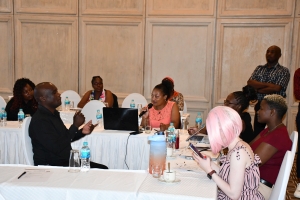
Persons with disabilities continue to face stigma and discrimination in workplaces and learning institutions. There is a need for proactive measures that address the inequalities that persons with disability experience which severely limit their ability to have a voice. Addressing disability lies at the heart of meaningful and inclusive development as part of the journey towards social justice for all.
The ILO and the UNESCO Regional Office for Southern Africa organized are jointly implementing the United Nations Partnership on the Rights of Persons with Disabilities (UNPRPD) Multi-Partner Trust Fund (MPTF Multi-country project). The project, titled: Ending stigma and discrimination: Breaking the cycle of poverty and marginalization of persons with disabilities is being implemented in Mozambique, Namibia, Tanzania, and Zimbabwe.
As part of project roll-out in Zimbabwe, in November 2023, the project commissioned a situational analysis that was conducted in learning institutions and workplaces to assess challenges faced by leaners and workers with disabilities. A national workshop to validate the findings was organized.
- The results of this study highlighted the existence of discriminatory tendencies that include:
- Lack of knowledge and understanding of what disability is.
- Absence of policy guidelines in both TVET institutions and the workplace.
- Lack of political will by those in very influential positions of authority who can possibly influence or effect change.
- Absence of reasonable accommodation guidelines in the TVETs for both leaners and workers.
- Continued stigma and discrimination for persons with disabilities.
- Those with hearing impairment continuously being marginalised because of the language barrier.
- Absence of sign language interpreters to necessitate communication with the hearing impaired.
- Disability being misconstrued as inability.
Some psychosocial disabilities remaining hidden for fear of stigmatization and discrimination (non-disclosure). To address these multi-layered anomalies, the response requires a multi-stakeholder approach to implement the reasonable accommodation processes, including enabling persons with disabilities (PWDs) to speak out for themselves, among others.
The employers’ group in attendance raised concern on the cost of aligning their work-methods to accommodate PWDs, it was pointed out that the processes could be rolled-out at minimal cost, and they were encouraged to also leverage on the power of technology.
To further allay the various concerns, the workshop proposed the development and drafting of a framework on ‘minimal criterion’ for providing ‘reasonable accommodation’ that institutions could refer to for guidance.
The workshop brought together all the Ad Hoc Dialogue Committees including organizations for persons with disabilities, government departments, the private sector and civil society in a bid to reach consensus on recommendations for developing ‘reasonable accommodation’ guidelines whilst simultaneously addressing stigma and discrimination issues in TVET institutions and the workplace.
Globally, an estimated 15 percent of the world’s population – some 1 billion people – live with disabilities that have a direct impact on their daily lives. One in every four households has a family member with a disability. While persons with disabilities account for a large proportion of the world’s population, they have been consistently left out of the gains made by global development.
Disability inclusion promotes a working environment where everyone is treated with dignity and respect, where the talents and skills of different groups are valued, and where productivity improves because the workforce is motivated.
Reasonable accommodations enable employees to bring their full self to work and thereby contribute to business success. It further aims to ensure that persons with disabilities enjoy human rights and other fundamental freedoms equally as everyone else. Persons with disabilities themselves know their needs and should be consulted at every level of the process.
The United Nations Partnership on the Rights of Persons with Disabilities (UNPRPD) is a unique partnership that brings together UN entities, governments, OPDs and broader civil society to advance the rights of persons with disabilities around the world.


